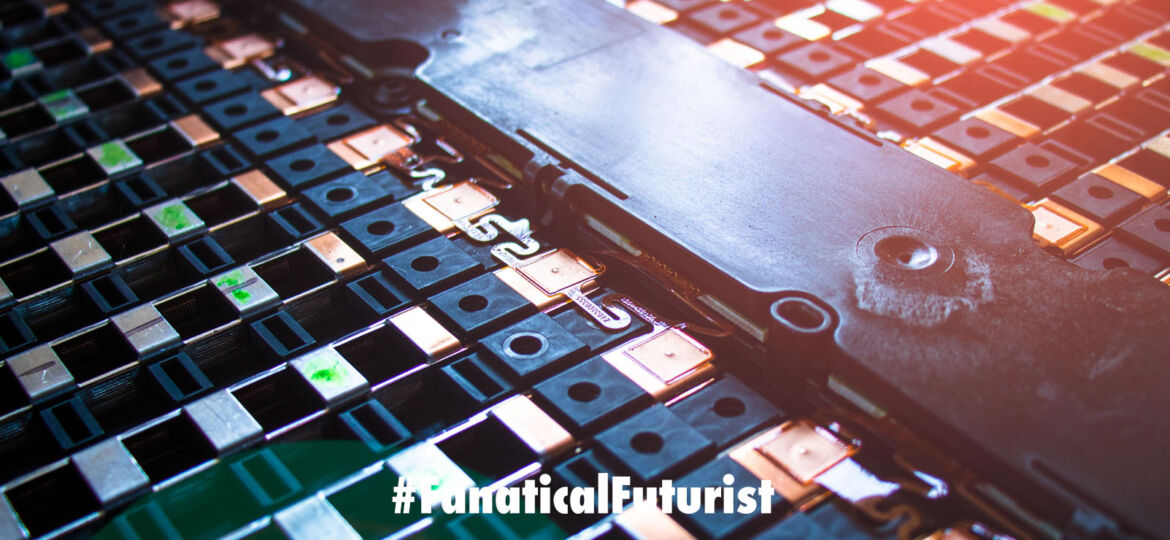
WHY THIS MATTERS IN BRIEF
In ten years time the world will be inundated with old EV Lithium Ion batteries – and now we have a way to recycle them.
 Love the Exponential Future? Join our XPotential Community, future proof yourself with courses from XPotential University, read about exponential tech and trends, connect, watch a keynote, or browse my blog.
Love the Exponential Future? Join our XPotential Community, future proof yourself with courses from XPotential University, read about exponential tech and trends, connect, watch a keynote, or browse my blog.
Electric cars are already more environmentally friendly than their internal combustion engine (ICE) counterparts, and that’s before I discuss BMW’s latest circular economy car concept the iVision Circular. But they still have one major Achilles heel – what do you do when the hundreds of millions of Lithium Ion (LiON) batteries that power all these vehicles reach the end of their useful lives?
One answer is to use them as grid scale storage to support renewable energy generation sources such as wind and solar power as Mercedes are doing in Germany, and bearing in mind that these batteries don’t need to be in the best condition to do this it’s estimated that this could extend the useful life of many LiON batteries to well over two decades. Which is handy. And now another solution, finally, is to recycle them and then use the raw materials to make new batteries.
The Future of Energy 2050, by Keynote Matthew Griffin
This week a Swedish company announced it successfully recycled a LiON battery cell containing a Nickel-Manganese-Cobalt (NMC) cathode, using only metals recovered via battery waste, according to a press release from the firm.
Called Northvolt, the company claims its “Revolt” recycling program has become the first to recycle an EV battery using 100% reused materials.
All of Northvolt’s recycling and production measures took place at one site, within its labs in Västerås, Sweden. And it’s a significant breakthrough for the global battery industry, as it tries to make the nascent EV industry truly sustainable.
Creating brand new LiON batteries relies on the extensive mining of raw materials such as Cobalt, Lithium, Nickel, and others which is often an environmentally damaging practice and even though there are new solutions to this problem emerging, such as being able to mine Lithium from seawater, it’s largely seen as unsustainable.
Now though Northvolt’s new recycling process can recover up to 95% of the metals in batteries, maintaining a purity level comparable to “virgin” material, said Chief Environmental Officer Emma Nehrenheim of Northvolt, in the release. The next step is finding out whether Northvolt and other firms can scale new recycling processes in preparation for the greater volume of battery recycling to come.
Recycled cobalt, manganese, and nickel used in the new battery cell were gathered from battery waste via a low-energy hydrometallurgical treatment which involves the use of an aqueous solution to isolate the metals and empty them of remaining impurities. The next step for Northvolt involves producing cells with 50% recycled material at industrial scales by 2030.
In line with this goal, the company’s Revolt Ett giga-scale recycling plant in Skellefteå, Sweden, will be expanded past its earlier design, to make space for the recycling of 125,000 tons of batteries every year. This will make Revolt Ett Europe’s largest battery recycling plant, in addition to the only large scale recycling factory that can recycle and reuse lithium, cobalt, manganese, and nickel, as well as other metals which will provide the raw materials for the neighboring Northvolt Ett cell manufacturing gigafactory that will have enough raw material to build 30 GWh of battery production every year, which is half of the total yearly cell output of Nortvolt Ett.
Other metals recovered by Revolt Ett will include aluminum, copper, and plastics, and all of these can be recirculated into manufacturing flows via third-party businesses.
“As the electric vehicle revolution gains speed, we should be mindful that some 250,000 tons of batteries will reach their end-of-life in Europe by 2030,” said Nehrenheim in the release. “In this, some see challenges and obstacles. At Northvolt, we see opportunity. Similar to how we’ve found novel, sustainable solutions for the handling of salt byproduct at Northvolt Ett — treating it as a valuable product and not waste — the same is true with end of life [LiON] batteries.”
“Ultimately, a commitment to circularity will not only significantly reduce the environmental impacts of the battery industry, but also contribute to our vision to set a new benchmark for sustainability in manufacturing,” added Nehrenheim.
Obviously this is a major step in a rapidly evolving industry that in some ways have solved some problems while creating others. It also follows hot on the heels of Tesla’s announcement in August in which they announced they could recycle 92% of battery cell materials after recovering 1,300 tons of nickel in 2020. So now the recycled battery problem is being solved now we just need to solve the problem of powering EVs with fossil fuels …
















